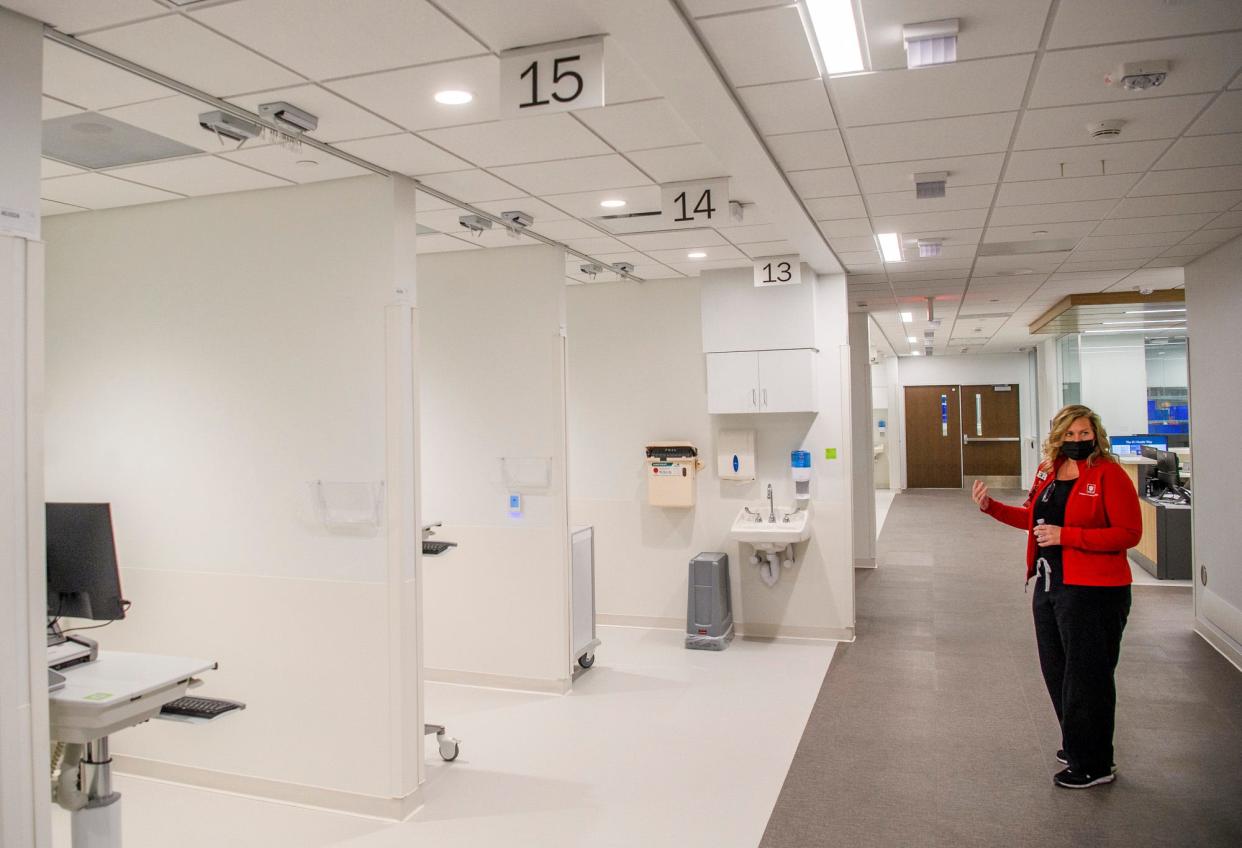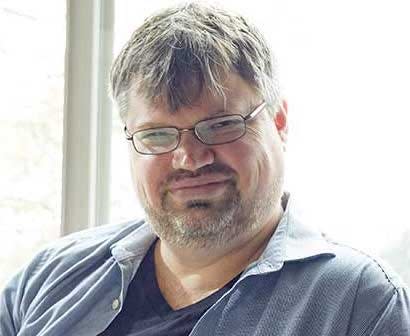Seeking a primary-care doctor in Bloomington? Few taking new patients and the wait is long

Bloomington resident Eric Nichols recently tried to make an initial appointment with a family doctor and was told the earliest available slot was in August — of 2024.
“Threw me for a loop,” he said. “I asked them to repeat it to see if I had heard it right.”
Nichols, an Indiana University graduate, moved from Seattle back to Bloomington in February, because he and his wife, Andrea, work remotely for Zillow and Microsoft.
Before trying to make an appointment with a local physician, he did some research about their background, rating and whether they accept new patients.
FOR SUBSCRIBERS: IU Health promised to freeze prices, then added fees to Bloomington patients' bills
He called a scheduler and was told the doctor he had chosen would have an opening no sooner than summer 2024. He then asked about other doctors whose calendars also appeared to be booked about 2.5 years out. He finally settled on the first available doctor, but that appointment still was seven months away.
A local Community Voices for Health Initiative report released in January acknowledges the local doctor shortage.
“Monroe County continues to be considered to be a Medically Underserved Area and Health Professional Shortage Area, with one primary care doctor per 1,710 residents, one dentist per 1,930 residents, and one mental health provider per 400 residents,” it said.
Consequences of waiting to see a doctor
Long wait times can lead to delayed care and delayed diagnosis that can worsen health outcomes, said Kosali Simon, an expert in health economics and Distinguished Professor in the O'Neill School of Public and Environmental Affairs.
People who lose their doctors to retirement or a move typically need a longer initial appointment with any new doctor, and those “seem to be so difficult to get,” Simon said.
Those longer wait times could pose a risk especially to people who are suffering from undiagnosed diseases or from persistent aches and pains that do not require emergency care. Some of those aches and pains might resolve on their own, Simon said, but for many conditions early diagnosis can make a huge difference.
Health: 'Life saver' skin patch to detect, instantly reverse drug overdose in development at IU
“We never know which is the thing that … you really should have caught early,” she said.
The delays can prove especially problematic for people who have to overcome other barriers that make it more difficult to get to appointments, said Michelle Gilchrist, president and CEO of the Bloomington Health Foundation, which helps people overcome those barriers.
Some people cannot simply take a day off when an appointment is available, and others may live in more rural areas and/or rely on a friend or relative for transportation, which makes scheduling a medical appointment even more difficult, she said.
And when patients have to wait, their condition sometimes worsens, which means they may have to schedule another appointment with a specialist, of whom the community also does not have enough, Gilchrist said.
Nichols said long delays can present serious challenges for people like him who take medications regularly. He saw his physician in Seattle every three months.

Nichols also said a medical scare a while ago reinforced in him the importance of regular checkups: A doctor found a spot on his finger, which turned out to be a benign tumor and was removed surgically.
According to the Kaiser Family Foundation, Indiana in September was short nearly 200 health care professionals. The Association of American Medical Colleges expects that in 2033, the U.S. will be short between 54,100 and 139,000 full-time equivalent physicians.
In spring 2021, Bloomington focus groups identified health care access as the second biggest need facing city and county residents. Access to mental health care ranked first.
Indiana University Health
Indiana University Health's physician network dominates the local health care landscape, with 82 primary-care providers, including nurse practitioners. Of the doctors listed on the IU Health website in April, just a few were accepting new patients.
Most of those with appointments to offer are booked for the next year or so, now scheduling in the spring of 2023.
For example, Drs. Michael Teague and James Archer had appointments available in 11 months. Drs. Lori Thompson and Catherine Sinkhorn had openings in February 2023, and Dr. Fan Wu has appointments available this fall.
People seeking a doctor can complete an online "find a provider" form at iuhealth.org requesting an appointment with a physician or nurse practitioner.
There's also an option for anyone who becomes ill and needs to see a doctor immediately but doesn't have one: They can schedule a one-time appointment with an IU Health acute care doctor, often the same day, for treatment or possible referral.
The IU Health Bloomington network has 16 family medicine doctors. There also are two doctors of osteopathic medicine, called a DO, who focus on whole-body healing and holistic health care.
In addition, IU Health has 32 nurse practitioners in the Bloomington-based primary care network, according to its "Find a Physician" online list. They are nurses trained to assess patients, order tests, interpret results, diagnose illness and prescribe medications and treatment. Some are accepting new patients.
Beyond the adult primary care providers are 11 internal medicine specialists, 11 pediatricians and also doctors in specialty areas such as gastroenterology, neurology, obstetrics, gynecology, orthopedics, psychiatry and palliative care. Many of these doctors are accepting new patients, but an appointment could be months down the road.
A 2020 Miami Herald article focused on the primary-care doctor crisis. The president of St. George's University in Grenada, which sends more first-year medical residents to the U.S. than any other medical school, said 70% of students there go into specialty fields.
That leaves just 30% to fill primary-care jobs, exacerbating the shortage.
IU Health public relations manager Robin Lasek said the network is aware of the shortage of primary-care providers and how delays in obtaining healthcare adversely affect community health outcomes.
She said IU Heath is working to address the issue by hiring more doctors amid a nationwide shortage, focusing the search in its own backyard.
"We are fortunate to have a strong partnership with IU and the IU School of Medicine to aggressively fund efforts to recruit top physicians and educate our future health care professionals," Lasek said in a statement responding to questions about how the hospital is managing the shortage.
She said 20 primary-care providers have been recruited to work in IU Health's South Central Region this year and in 2023, and that the network will "continue to actively recruit for additional needs." Several local doctors have left IU Health for other employers or retired.
She said affordable and accessible care for people without a doctor is available through online video visits, home care and at IU Health's urgent care center at 326 S. Woodscrest Drive in Bloomington.
Monroe Medical Group
Another option for people in and around Monroe County is medical care providers in the much smaller Monroe Medical Group, affiliated with Monroe Hospital.
Its website lists a family practice physician, an osteopathic doctor, two internal medicine doctors, a rheumatologist, a pathologist, a pulmonary specialist, a podiatrist, two general surgeons and seven nurse practitioners.
The hospital's Find A Provider feature doesn't indicate which Monroe Medical Group doctors and nurse practitioners are taking new patients. There's an online find-a-provider form to fill out for people interested in seeing a doctor at monroehospital.com.
Monroe Hospital is part of Prime Healthcare system, which operates 45 hospitals and more than 300 outpatient centers in 14 states.
No doctor available 'within six months'
Bloomington City Council President Susan Sandberg said that she, too, struggled to find a new family physician when her former doctor said she was going to retire. Sandberg said she called several offices but was told none of the doctors was accepting new patients.
“I knew it was going to be a bit of a challenge,” she said.
Sandberg said she was seeing her prior doctor once a quarter, in part to keep up on her medications and to maintain a good handle on her Type 2 diabetes, which she has had about a decade.
Thankfully, she said, her doctor gave her adequate time before retiring in April, and Sandberg got an appointment fairly quickly in part because her younger sister goes to the same physician.
Bloomington resident Peter Dorfman said he and his wife also had a tough time recently getting a doctor’s appointment. Dorfman had made an appointment for December, but was told around Thanksgiving the doctor was leaving her practice. The Dorfmans shifted to a new doctor but could not get an appointment until about six months later.
Nichols said that after he asked for the first available appointment he got a slot in September, and his wife was given one for October.
He said the scheduler also set up a “bridging appointment” with a nurse practitioner within a matter of weeks, primarily to refill a prescription. As he tried to transfer the medication pickup to another pharmacy, the doctor with whom he had scheduled an appointment in September reached out to him and said he needed to come in right away because of a possible problem with the medicine.
However, Nichols said he got the “bonus appointment” basically by accident, because of his request to change pharmacies. Everybody else who wants to make an appointment with a doctor simply has to wait.
“There still isn’t anybody (available) within six months,” he said.
Contact reporter Laura Lane at llane@heraldt.com, 812-331-4362 or 812-318-5967. Contact reporter Boris Ladwig at bladwig@heraldt.com or 812-764-2852.
This article originally appeared on The Herald-Times: Few primary-care doctors in Bloomington taking new patients

